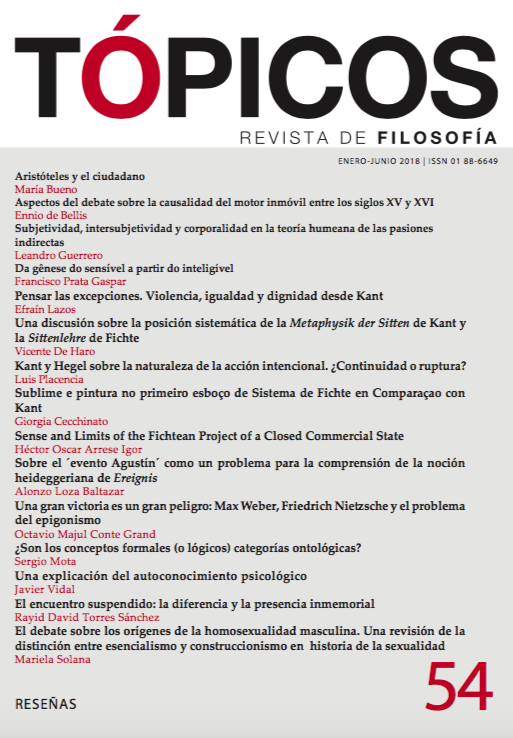Publicado 2017-11-11
Palabras clave
- historia de la sexualidad,
- esencialismo,
- construcción social,
- homosexualidad masculina,
- filosofía de la historia
Cómo citar
Resumen
Este artículo analiza el debate entre John Boswell y David Halperin en torno a los orígenes históricos de la homosexualidad masculina. Si para el primero es posible afirmar que existieron personas gays en la Antigüedad y el Medioevo, para el segundo la homosexualidad, tal como la conocemos, es un invento moderno. El artículo argumenta que entender este debate como un choque entre esencialistas y construccionistas sociales –tal como fue leído por sus comentadores– es problemático y sugiere una lectura alternativa a partir de las ideas de figuralismo e irrealismo. Como consecuencia, propone que además del esencialismo sexual, los estudios de género y sexualidad deberían desconfiar del esencialismo histórico y comprometerse con un pluralismo historiográfico.
Descargas
Referencias
- Berkhofer, R. (1995). Beyond the Great Story. History as Text and Discourse. Londres: Harvard University Press.
- Boswell, J. (1989). Revolutions, Universals, and Sexual Categories. En M. Duberman, M. Vicinus & G. Chauncey. (eds.) Hidden from History: Reclaiming the Gay and Lesbian Past. Nueva York: New American Library.
- _______ (1981). Christianity, Social Tolerance, and Homosexuality. Gay People in Western Europe from the Beginning of the Christian Era to the Fourteenth Century. Chicago y Londres: Chicago University Press.
- Bravmann, S. (1997). Queer Fictions of the Past: History, Culture and Difference. Cambridge: Cambridge University Press.
- Danto, A. (1989). Historia y narración. Ensayos de filosofía analítica de la historia. Barcelona: Editorial Paidós.
- Duberman, M., Vicinus, M. & Chauncey, G. (1989). Introduction. En M. Duberman, M. Vicinus & G. Chauncey. (eds.) Hidden from History: Reclaiming the Gay and Lesbian Past. Nueva York: New American Library.
- Foucault, M. (2013). La inquietud por la verdad: escritos sobre la sexualidad. Buenos Aires: Siglo XXI.
- _______ (2006). Historia de la Sexualidad I: La voluntad del saber. Buenos Aires: Siglo XXI.
- Hacking, I. (2002). Historical Onthology. London: Harper University Press.
- _______ (1999). The Social Construction of What? Cambridge: Harvard University Press.
- Halperin, D. (2000). How to Do the History of Homosexuality. GLQ: A Journal of Lesbian and Gay Studies, 6, 1, 87-123.
- _______ (1990). One Hundred Years of Homosexuality and Other Essays on Greek Love. Nueva York: Routledge.
- _______ (1989). Sex Before Sexuality: Pederasty, Politics, and Power in Classical Athens. En M. Duberman, M. Vicinus & G. Chauncey. (eds.) Hidden from History: Reclaiming the Gay and Lesbian Past. Nueva York: New American Library.
- Hubbard, T. (2003). Homosexuality In Greece And Rome: A Sourcebook Of Basic Documents. Berkeley: University of California Press.
- Padgug, R. (1989). Sexual Matters: Rethinking Sexuality in History. En M. Duberman, M. Vicinus, & G. Chauncey. (eds.) Hidden from History: Reclaiming the Gay and Lesbian Past. Nueva York: New American Library.
- Platon (1997). El banquete. Buenos Aires: Alianza.
- Rorty, R. (1998). The Historiography of Philosophy: Four Genres. En R. Rorty, J. B. Schneewind & Q. Skinner. (eds). Philosophy in History. Essays on the Historiography of Philosophy. Cambridge: Cambridge University Press.
- Roth, P. (2012). The Pasts. History and Theory, 51, 313-339.
- Sedgwick Kosofsky, E. (1998). Epistemología del armario. Barcelona: Ediciones de la Tempestad.
- Skinner, Q. (2002). Vision of Politics I: Regarding Methods. Cambridge: Cambridge University Press.
- Solana, Mariela. (En prensa). Reflexiones sobre el giro afectivo en historia queer. Mora. Revista del Instituto Interdisciplinario de Estudios de Género (FFyL; UBA), 22.
- Weeks, J. (1989). Inverts, Perverts, and Mary-Annes: Male Prostitution and the Regulation of Homosexuality in England in the Nineteenth and Early Twentieth Centuries. En M. Duberman, M. Vicinus & G. Chauncey. (eds.) Hidden from History: Reclaiming the Gay and Lesbian Past. Nueva York: New American Library.
- White, H. (2010). La historia literaria de Auerbach. Causalidad figural e historicismo modernista. En Ficción histórica, historia ficcional y realidad histórica. (33-52). Buenos Aires: Prometeo.
- _______ (2010a). Realismo figural en la literatura testimonial. En Ficción histórica, historia ficcional y realidad histórica. (183-202). Buenos Aires: Prometeo.
- _______ (2003). El texto histórico como artefacto literario. Buenos Aires: Paidós.
- _______ ([1973] 1992). Metahistoria. La imaginación histórica en la Europa del siglo XIX. México: Fondo de Cultura Económica.
- _______ (1966). The Burden of History. History and Theory, 5, 2, 111-134.






